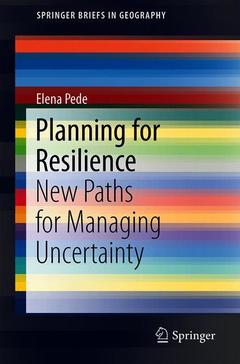Description
Planning for Resilience, 1st ed. 2020
New Paths for Managing Uncertainty
SpringerBriefs in Geography Series
Author: Pede Elena
Language: English
Subjects for Planning for Resilience:
88 p. · 15.5x23.5 cm · Paperback
Description
/li>Contents
/li>Biography
/li>Comment
/li>
Given the increasing uncertainty due to catastrophic climate events, terrorist attacks, and economic crises, this book addresses planning for resilience by focusing on sharing knowledge among policy-makers, urban planners, emergency teams and citizens. Chapters look at the nature of contemporary risks, the widespread of resilience thinking and the gap between the theoretical conception and the practices. The book explores how resilience implies a change in planning practices, highlighting the need for flexibility in terms of procedures, and for dynamism in the knowledge systems and learning processes that are the main tools for interaction among different actors and scales. Given its breadth of coverage, the book offers a valuable resource for both academic readers (spatial planners, geographers, social scientists) and practitioners (policymakers, citizens? associations).
Elena Pede is Post-Doctoral Research Fellow at Interuniversity Department of Regional and Urban Studies and Planning, Politecnico and Università di Torino, Italy. Her main research interests focus on knowledge and learning in social-ecological system resilience and territorial governance. She took part in national and international research projects working on territorial development and planning for resilience (ESPON, INTERREG). Currently, her research activity is focused on climate change adaptation measures in planning tools and inner peripheries.
Discusses a multidisciplinary framework focused on planning theory, sociological risk approach, and knowledge management
Outlines the resilience concept that is applied to the entire PPRR (prevision-prevention-response-recovery) chain
Offers an in-depth unpublished Italian case study on earthquakes and hydrogeological risks




